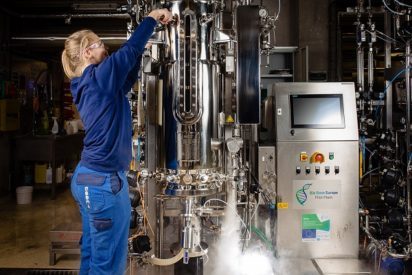Synthesis and transformation of muconic acid into platform molecules starting from biomass
Fermentative production of muconic acid (MA) from 2nd generation feedstocks using engineered yeast and its chemical conversion to levulinic acid.
The sustainable low-carbon chemical industry of the future will require new platform chemicals originating from abundant biorenewable resources which are not in competition with the food chain. Muconic acid (MA) has been proposed as a biobased platform chemical which can be transformed into industrially important commodity chemicals, such as adipic acid, terephthalic acid and caprolactam allowing to make bioplastics.
Although MA typically appears in lists of top future biobased chemicals there are many fundamental challenges to be solved in its fermentative production. This project aims to improve the fermentative process to MA from sugars originating from inedible waste (2G) biomass, in particular from abundant waste streams present in Flanders. Both by improvements in the genetically engineered yeast producing MA, as well as by developing suitable in-situ product recovery techniques we aim to increase the yield and productivity of the fermentative process.
With this crude fermentative MA, new chemical transformations to building blocks with current and emerging applications will be explored, hereby creating new markets for MA. This research involves an iterative feedback loop to achieve a suitable separation of MA from the fermentation stream enabling maximal selectivity and yield in the follow-up chemical transformations, avoiding the need to use purified MA.
ACTIVITIES of the Bio Base Europe Pilot Plant
BBEPP will develop an innovative fermentation process with in situ product recovery to produce muconic acid with increased performance.
PARTNERS:
- University of Antwerp, BE (Coordinator)
- KU Leuven, Laboratory of Molecular Cell Biology, BE
- Bio Base Europe Pilot Plant, BE
SUPPORTED by:
This Project within the framework of the FWO Bioeconomy Impulse Programme (file number GOG2622N) has received funding from the European Union – NextGenerationEU.





 webdesign
webdesign